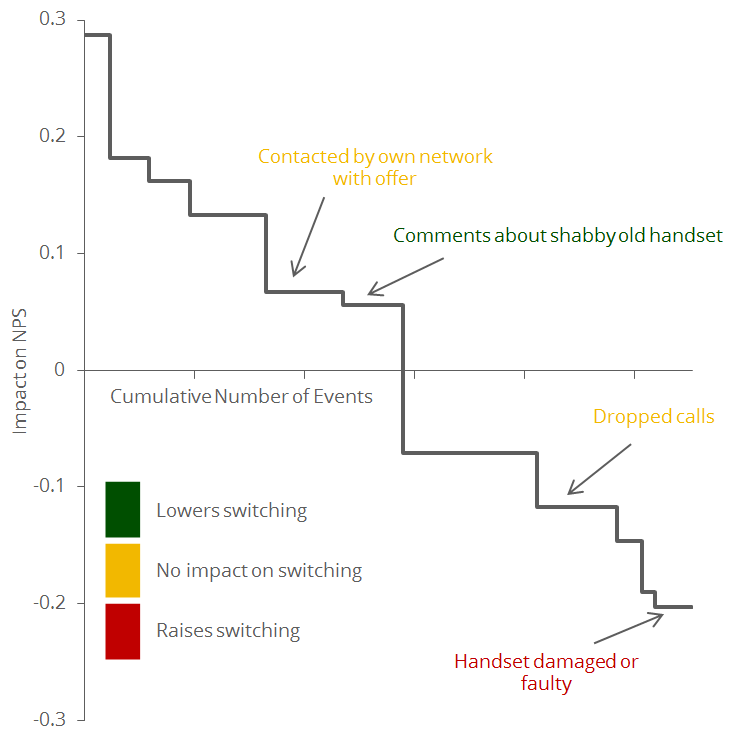How Useful is NPS?
Posted: 10/08/2015

We argue that revenue-growth and NPS are only correlated because they are both directly caused by an overlapping set of customer experiences. But there are also experiences which drive NPS and not growth and vice versa. Using a recent case study we demonstrate how 80% of the effort sunk into managing NPS is wasted.
In 2003 Fred Reichheld, an employee of the strategy consultants that spawned Mitt Romney, Bain & Co., published an article in the Harvard Review claiming that his net promoter score (NPS) was the best way to predict corporate revenue growth1. With Bain and Harvard Business School behind the scheme, NPS now governs hundreds of global corporations including Procter & Gamble, Apple, Vodafone, Citigroup, the BBC, Avis, and, perhaps most weirdly, the Boy Scouts of America. And where it takes hold, NPS can become deeply embedded. One of our clients now has 17 separate NPS trackers running across its operations.
NPS is a simple measure of customer loyalty that asks, on a 0-10 scale, “How likely are you to recommend our company to your friends and colleagues?” The score is the percentage obtained by subtracting detractors (0-6) from promoters (9 and 10). But is NPS really so great? Certainly, others have demonstrated that NPS is, at best, no better than other customer satisfaction measures2. And they at least had the self-confidence to publish their findings in proper peer-review journals, rather than Harvard’s school magazine, alongside pictures of Year One’s recent trip to Normandy.
Mobile Phone NPS

We outlined in an earlier post how customer touchpoints entirely determine brand images, NPS included. It is also true that such events cause customer revenue behaviours, like retention. Accordingly, we have argued that the link between NPS and growth is from them both being associated with certain customer types and customer events. So why don’t we just forget NPS and concentrate on delivering the right customer experiences? Or, to put it another way, if we invest in NPS, are we wasting money on activities that don’t improve sales and vice versa?
The figure shows that for mobile phones, the answer is “yes”. Out of hundreds of events, we found that 11 influenced NPS. For example, being contacted by your network with a new deal happens quite often and raises NPS. But it doesn’t reduce switching propensity. Conversely, being the butt of jokes about your old handset both raises NPS and reduces switching, because it’s a sign that you are the kind of person who isn’t that fussed and is happy with what you’ve currently got. Overall, just two of the eleven events that cause NPS also cause switching. So, as a rough indication, this implies that about 80% of any effort to improve NPS is wasted. Bring it on, Reichheld.
1. Reichheld, F. (2003). One Number You Need to Grow. Harvard Business Review, 81(12), 46-54
2. Keiningham, T., Cooil, B., Andreassen, T. & Aksoy, L. (2007). A Longitudinal Examination of Net Promoter and Firm Revenue Growth. Journal of Marketing, 71(3), 39-51